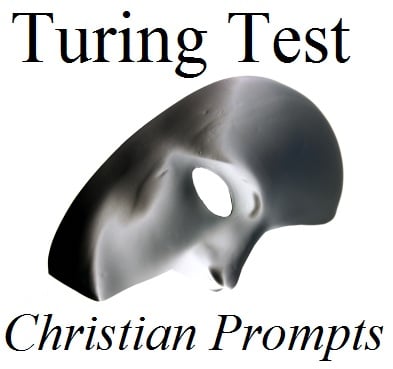This is the twelfth and final entry in the Christian round of the 2013 Ideological Turing Test. This year, atheists and Christians responded to questions about sex, death, and literature.
Polyamory
Since the dawn of humanity, the divine model for intimate love has been simply one of paradise: the incomparable union between two people. Compelling and enduring, our legal system has taken this cue for intimacy, defining the structure for marital partnership as limited to two adults.
But can’t we dismiss this limitation as constrictive? Perhaps — but to do so is to dismiss the great value of love’s constraints. We elevate love above all other states because it cannot be simply reduced to a mere feeling. Love persists in loving, when it’s no longer convenient, immediately gratifying or comfortable to do so. Like all acts of sacrifice, it is not done for the self, but for object of affection. Thus love, as still stated in traditional marriage vows, “forsakes all others.” This abandonment of all other possibility is how we have defined marriage – as well as its inverse, bachelorhood.
Is this a needless restriction of freedom? While the two-person model does include some measure of loss for the individual, it provides direct benefit to the spouse. Faithfulness to one person eliminates the sexual health risks of multiple partners — increasingly important in a day and age plagued by AIDS. This exclusive dynamic also heightens healthy interdependence in marriage, adding physical reasons to sustain ongoing emotional engagement with your sole partner. Marriage, in short, “ups the ante” of a relationship through limitation of choice.
This allows marriage to demonstrate strength of commitment. The government provides incentives (from green cards to tax breaks) for those willing to commit to a lifetime. If “polyamorous marriages” were sanctioned, gauging commitment level would be virtually impossible. We require a single “home address” (even for those with multiple houses) and a single party declaration (even for those with complex views). To extend the highest social value of love – one defined by selective, limited choice – to unlimited partners is to have virtually no “highest” form of love, and no actual selection, at all.
“Polyamorous marriage” would also create a logistical nightmare for the modern family. Even if custody rights defaulted to biological parents, adoptive rights transfers could create unlimited guardians for a single child, causing clashes in medical and educational decisions. Children would undoubtedly face severe attachment issues in childhood — a predictor of romantic security as adults. Polyamorous marriages could also prove financially devastating, particularly if the notion of simultaneous divorce were granted (as causes such as abuse may affect multiple spouses simultaneously).
Most importantly, polyamory prevents the need to develop the self to its utmost potential. When the burden of love is shared, a single person simply does not have to offer everything we need in a life partner. The trade-off is never truly experiencing the intimacy inherent with having all your needs met by a single, eclipsing one. Marriage indicates a love so strong, it cannot help but be single-focused, allowing you to devote all of yourself wholly to another — something logically impossible to accomplish in more than one direction.
Euthanasia
During our time here, we’re each gifted with one life – a single chance to use our senses, experience a fleeting thought or memory, feel warmth, perceive light, injure and recover. To revoke these rights through euthanasia amounts to nothing more than murder: the abrupt ending of a life that was never ours to give or take.
Not even dire medical prognoses justify euthanasia. Man can’t possibly feel entitled to life-and-death judgment calls based on a consciousness modern medicine can’t even accurately assess. Medicine’s best guess at consciousness – the popular Glasgow coma scale – is a rudimentary attempt to divine what only God can (by using the rough and problematic standards of motion, speech and perceived pain response). We can’t play God, simply because we don’t have the capacity; as humans, we will inevitably make mistakes – and we can’t afford to make mistakes with stakes running as high as human life.
Ancient history texts (from Herodotus, Hippocrates, and The Bible) include accounts of those who defied the medicine of their respective day. Modern accounts range from spontaneous remissions of cancer to regained consciousness after clinical pronouncements of death. Today’s miracles are tomorrow’s science, as we learn more about death, the human body, and the links between spirituality and recovery.
In cases where the patient himself decides life is not worth living, euthanasia plainly amounts to assisted suicide. While terminal patients certainly reserve the right to refuse potentially harmful treatments, to stop air- or sustenance-giving interventions is the moral equivalent of starving a child to death, or refusing to clear an infant’s airways simply because they cannot do so on their own.
Even the practice of withholding medical care allows us to commit passive, socially-sanctioned, premeditated murder. Most health care rationing decisions (including the infamously proposed “death panels”) rest on outcome probabilities (age, advanced illness, etc.) and cost-benefit algorithms, despite being marketed as “morality.” We roadblock treatment given to those who desperately need it most, skewing the data for treatment survival rates in the process – the same survival rates used to justify denial of life-saving measures.
I used to consider proponents of euthanasia as heartless, but I’ve found they’re more often sensitive – to a fault. The thought of watching someone enduring great pain rattles them to a degree they’d prefer to end a life permanently rather witness – and co-endure – suffering. This “compassion” is ultimately driven by a society exceedingly uncomfortable with physical pain, poor odds, and the dying process itself – and projection of helplessness, sadness and sense of injustice onto the patient as if it were his response. We euthanize to halt our own suffering. We tell ourselves patients have found the ultimate relief – but really, we have found it ourselves through their elimination.
As humans, we have the responsibility to care for one another in body, as well as spirit. Only when we extend this measure of compassion, hope and philanthropy to the human spirit will we offer the human body a fair chance for recovery and resilience.
Bonus
My faith is a reflective essay, interweaving the text of scripture, the depth of personal experience, and the universal implications of an explored theme.
Because of my belief that scripture is divinely inspired, close reading of the Bible’s text becomes paramount in my life story. Scripture becomes the basis of any thesis I form about the world. My convictions hinge on the most accurate analysis of the literal Word of God – the original language and intent, the exactness of diction divinely inspired, and the preservation of its statements even amid human temptation to color them.
Like the reflective essay, my faith also incorporates first-hand, personal experience. The Bible didn’t save me, and while I strive to fall in line with its standards, it doesn’t forge choices for me. Within a dynamic relationship with God – as He illuminates the days of my life – I make decisions, slowly becoming a “living version” of the scripture myself. And finally, as the reflective essay examines universal implications raised by the literature at hand, I apply my faith as best I can to the lost world around me.
These three aspects weave throughout my life, as the scripture, personal relationship, and outreach intermingle. Ultimately, the journey of my own life mirrors and magnifies the one in the text – and with study, meditation and prayer, I hope to find wider application of that thesis to a world in desperate need of applied mercy, love and compassion.
You can vote on whether you think these answers were written by a Christian or an Atheist here. Comments are open to discuss the substance of the post and for speculation about the true beliefs of the author, so please vote before looking at the comments.













